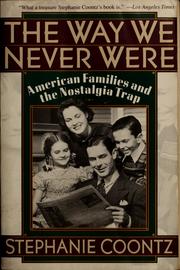Check nearby libraries
Buy this book

This myth-shattering examination of two centuries of American family life banishes the misconceptions about the past that cloud current debate about "family values." "Leave It to Beaver" was not a documentary, Stephanie Coontz points out; neither the 1950s nor any other moment from our past presents workable models of how to conduct our personal lives today. Without minimizing the serious new problems in American families, Coontz warns that a consoling nostalgia for a largely mythical past of "traditional values" is a trap that can only cripple our capacity to solve today's problems. From "a man's home was his castle" to "traditional families never asked for a handout," this provocative book explodes cherished illusions about the past. Organized around a series of myths and half-truths that burden modern families, the book sheds new light on such contemporary concerns as parenting, privacy, love, the division of labor along gender lines, the black family, feminism, and sexual practice. Fascinating facts abound: In the nineteenth century, the age of sexual consent in some states was nine or ten, and alcoholism and drug abuse were more rampant than today . . . Teenage childbearing peaked in the fabulous family-oriented 1950s . . . Marriages in pioneer days lasted a shorter time than they do now. Placing current family dilemmas in the context of far-reaching economic, political, and demographic changes, The Way We Never Were shows that people have not suddenly and inexplicably "gone bad" and points to ways that we can help families do better. Seeing our own family pains as part of a larger social predicament means that we can stop the cycle of guilt or blame and face the real issues constructively, Coontz writes. The historical evidence reveals that families have always been in flux and often in crisis, and that families have been most successful wherever they have built meaningful networks beyond their own boundaries.
Check nearby libraries
Buy this book

Previews available in: English
Subjects
Families, Conditions sociales, Nostalgie, Histoire, Nostalgia, Gezin, Familienleben, Geschichte, Social conditions, Heimwee, Famille, History, United States, Family, États-Unis, 20e siècle, United states, social conditions, Family, united states, Family, history, Familles, Familie, Families--history, Families--united states--history--20th century, Hq535 .c643 1992, 306.85/0973Places
United States, États-Unis, USATimes
20th century, 20e siècleShowing 6 featured editions. View all 6 editions?
| Edition | Availability |
|---|---|
|
1
The Way We Never Were: American Families and the Nostalgia Trap
Mar 05, 2019, Hachette and Blackstone Audio, Basic Books
audio cd
1549123270 9781549123276
|
zzzz
Libraries near you:
WorldCat
|
|
2
The Way We Never Were: American Families and the Nostalgia Trap
Mar 29, 2016, Basic Books
paperback
0465098835 9780465098835
|
eeee
Libraries near you:
WorldCat
|
|
3
The Way We Never Were: American Families and the Nostalgia Trap
August 2000, Basic Books
in English
0465090974 9780465090976
|
zzzz
Libraries near you:
WorldCat
|
|
4
The way we never were: American families and the nostalgia trap
1992, BasicBooks
in English
0465001351 9780465001354
|
eeee
Libraries near you:
WorldCat
|
|
5
The way we never were: American families and the nostalgia trap
1992, BasicBooks
in English
0465001351 9780465001354
|
aaaa
Libraries near you:
WorldCat
|
|
6
The way we never were: American families and the nostalgia trap
Publisher unknown
0465001351 9780465001354
|
zzzz
Libraries near you:
WorldCat
|
Book Details
Table of Contents
Edition Notes
Includes bibliographical references (p. [377]-379) and index.
Classifications
The Physical Object
ID Numbers
Source records
Work Description
"The Way We Never Were is an examination of two centuries of family life that shatter the myths that burden modern families and make them long for the past." "In a new introduction, Coontz examines key cultural events since the original 1992 publication - from Bill Clinton's sexual transgressions to high school shootings across the nation - and reexamines the myths that continue to compel the American people to long for a time that never was."--BOOK JACKET.
Excerpts
Community Reviews (0)
Feedback?| December 19, 2023 | Edited by ImportBot | import existing book |
| November 14, 2023 | Edited by MARC Bot | import existing book |
| July 22, 2022 | Edited by ImportBot | import existing book |
| August 24, 2020 | Edited by ImportBot | import existing book |
| July 8, 2011 | Created by ImportBot | import new book |


















